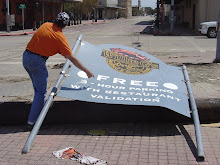Hello there. We all have alot of it. We accumulate, despite not liking it, not using it, or just not remembering it. People will be logging hundreds of items (if they are "lucky" enough that the "stuff" did not just get washed away) on each of their insurance claims. You see evidence of it all around in all of the piles. Some things were probably loved and used frequently, other things just cataloged and passed into the street.
Notes to self: Every once in a while, at least, walk through the house with a video camera slowly and capture everything. Also make sure that everything that you put away in your "emergency" kits not only are in a safe place (i.e. not near ground level, not under other things and only in plastic containers) but also have been played with (a disaster is the wrong time to figure something out or realize it is broken. Also make sure that you focus on things that really mean something to you so that you don't realize you should have focused on other things with your time.
What tips do you have for disaster preparedness? Please leave a comment. NOTE: You can leave a comment anonymously, you don't have to sign in if you don't wish.
Remember that you are not alone.
Subscribe to:
Post Comments (Atom)

1 comment:
"What tips do you have for disaster preparedness? Please leave a comment."
First of all, let me say thank you for continuing to update the Stormstuff Blog. I have been following it since I left UTMB, and Galveston, several weeks ago. Although I was only there briefly for the disaster-relief effort, I feel akin to the residents of Galveston Island and the good people I worked with while I was there.
Anyway, it may be late at this point but there is a book that you can get from FEMA called "Are You Ready." It is truly one of the best resources for disaster preparedness and is free. All you have to do to obtain it is follow the steps at the website below.
http://www.fema.gov/areyouready/
This guide will walk you through the steps required to prepare yourself, your home, and your family, for a disaster.
Post a Comment